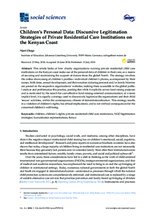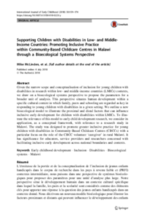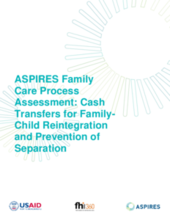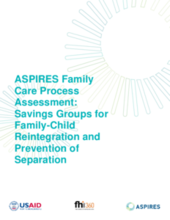Displaying 681 - 690 of 1623
The aim of the systematic review described in this article was to determine the outcome of child maltreatment in long-term childcare and the scope of the evidence base in this area.
This article looks at how charity organizations running private residential child care institutions on the Kenyan coast make use of the personal data of children in their care, as a means of securing and maintaining the support of donors from the global North.
This article from New Vision tells the story of Ruth Kahawa, a pastor in the Tororo district of Uganda who set up an orphanage in 1996 and now works to reintegrate children into families of origin or foster care.
This study draws on a bioecological systems perspective to propose the parameters for a broader unit of analysis of inclusion for young children with disabilities in research within low- and middle-income countries (LMICs) contexts.
This project, designed to explore parenting practices across various regions within Zambia, aims to further advance ongoing efforts to support early childhood development (ECD) by informing parenting programmes intended to promote optimal child development.
This evaluation examined the designs and implementation processes of the cash transfer components of ChildFund’s Economic Strengthening to Keep and Reintegrate Children in Family Care (ESFAM) and AVSI Foundation’s Family Resilience (FARE) projects in Uganda and identified practical lessons for implementers.
This evaluation examined the designs and implementation processes of the saving group components of ChildFund’s Economic Strengthening to Keep and Reintegrate Children in Family Care (ESFAM) and AVSI Foundation’s Family Resilience (FARE) projects in Uganda and identified practical lessons for implementers.
"Weak adoption laws could have also exposed hundreds of Kenyan children to abuse and exploitation both locally and internationally," says this article from Daily Nation.
The purpose of this study was to establish the prevalence of symptoms of anxiety disorder, depression and post-traumatic stress disorder (PTSD) among adolescents with a history of abuse and neglect living in charitable children’s institutions (CCIs) in Nairobi County, Kenya.
UNICEF is seeking a Child Protection Specialist in Somalia. Under the general guidance of the Chief, Child protection Section, and the direct supervision of the Child Protection in Emergency Specialist, the Child Protection Specialist will be






